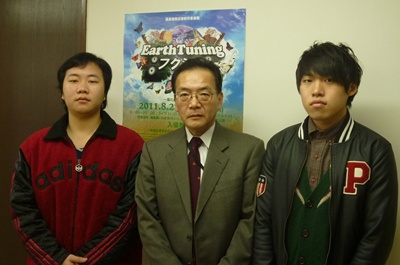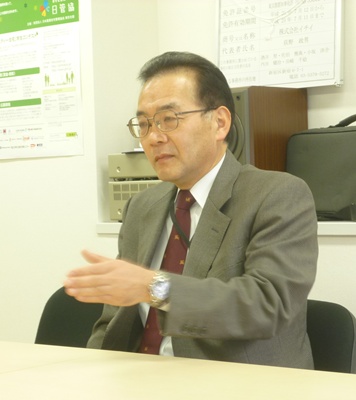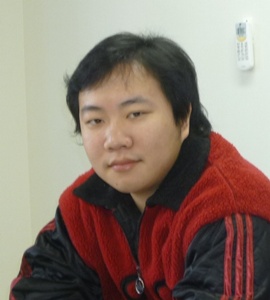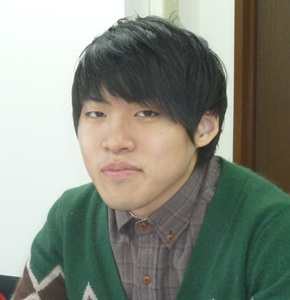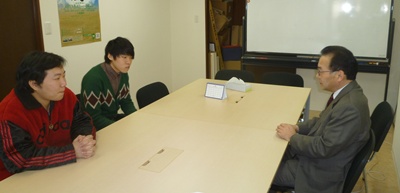The Original Social Business!
- 2012/01/27 23:59

The Original Social Business!
Never give up on Fukushima!!
After the March 11 earthquake, many people reaffirmed the importance of “people-to-people bonds.” In this interview, Shi In Ketsu (right, China) and Lee San Jun (left, South Korea) speak with Masao Ogino, a native of Iwaki City in Fukushima Prefecture, who is involved in support activities for the earthquake reconstruction, and is also the president of ICHII Corporation Ltd., a social business enterprise that provides housing support for foreigners.
Masao Ogino: President of ICHII Corporation Ltd. and chairman of the International Exchange Committee of the Japan Property Management Association. Returning home after living in several U.S. and European countries during his university years, Mr. Ogino decided to move into the property industry, providing housing for foreigners. With the industry expanding, Mr. Ogino has become a pioneer by holding seminars related to housing support for foreigners, as well as running a foreign student internship program. After the March 11 earthquake, he quickly returned to his hometown Iwaki City in Fukushima Prefecture, where he launched the “Fukushima International Media Village,” and is steadily continuing his activities with the aim of giving courage to the Iwaki locals.
Q: (Mr. Shi) What gave you an interest in housing problems for foreigners?
A: (Mr. Ogino)When I was a student I travelled to the US and England, where I rented and lived in various places. It was here I saw many different types of housing. In the guesthouses I stayed at there were people of various countries hanging out in the living room and enjoying their conversations with one another – regardless of age, sex, or nationality. It was very stimulating. When I first came back to Japan, I searched for accommodation where foreigners could live. Apart from places where embassy workers and executives from foreign companies would live – where the rent was $10000 a month – at the time there were no other places. One day, while searching for a house with a [foreign] university professor, we went to several real estate agents, but were turned away from most of them just because the professor was a foreigner. I realized then how hard it was for foreigners to look for housing, even if they were trustworthy people. Since then, I began to work in earnest in order to get rid of this kind of housing discrimination. After that, as foreigners in Japan increased my business began to grow, and I was able to build large corporate-style accommodation capable of housing over 100 people, just like the guesthouses I saw overseas. Now, guesthouses are becoming known in society, and are even reported on frequently in various media.
Q: (Mr. Lee) As chairman of the International Exchange Committee of the Japan Property Management Association, you must be making all kinds of new proposals to the industry.
A: (Mr. Ogino) That’s right. It’s part of my pride as a real estate agent! My parents were landlords, so when I was a child I lived in tenement housing with other residents where we got along well. Back in the day, part of a landlord’s job was looking after residents by, for example, helping them search for jobs and introducing them to prospective marriage partners. This was in return for receiving rent continuously from residents. This was the original role of real estate agents (i.e. landlords). Here we see the concept of “social business”, where the idea of valuing the community is an essential part of business. At the International Exchange Committee, therefore, we do things like hold seminars for people in the business, make multilingual DVD housing guides, as well as run an internship program for foreign students, in order to create an easier rental environment for foreigners.
Q: (Both interviewers) We’re very grateful for your kindness during our internships. Is that kind of sentiment also the basis for your support in your hometown of Iwaki, where we also helped out?
A: (Mr. Ogino) That’s right. It’s part of my pride as a real estate agent! My parents were landlords, so when I was a child I lived in tenement housing with other residents where we got along well. Back in the day, part of a landlord’s job was looking after residents by, for example, helping them search for jobs and introducing them to prospective marriage partners. This was in return for receiving rent continuously from residents. This was the original role of real estate agents (i.e. landlords). Here we see the concept of “social business”, where the idea of valuing the community is an essential part of business. At the International Exchange Committee, therefore, we do things like hold seminars for people in the business, make multilingual DVD housing guides, as well as run an internship program for foreign students, in order to create an easier rental environment for foreigners.
Q: (Both interviewers) Finally, what do you hope from today’s young people, and what kind of person would you like to work with?
A: In any case, I think it’s important for young people to go overseas while they’re young. Also, please mix with as many different people as possible and make friends all around the world. In terms of people I want to work with, they should have a sense of curiosity and enjoy challenges. Also, although work in real estate will change with the needs of the time, regardless of the age considerate communication will always be fundamental. If you’re someone who sympathizes with idea of making people happy through housing, then I would definitely want to work with you.
It is said that when foreign students come to Japan the first people they come into contact with are their Japanese language school teacher and a real estate agent. President Ogino, as a pioneer in the real estate world, has step-by-step single-handedly realized the oath he made over thirty years ago. It is precisely this social business manager who, thinking of his friends, is also involved in the Fukushima nuclear problem.
